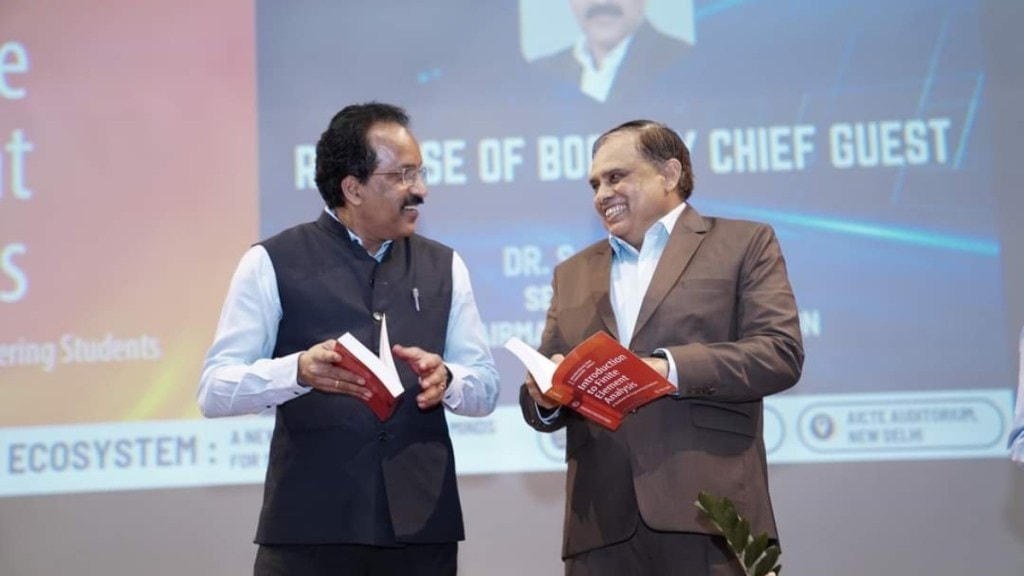The Indian Space Research Organisation (ISRO) and the All India Council for Technical Education (AICTE) have marked a significant milestone in advancing space education in India. Celebrating the first anniversary of National Space Day on August 23, 2024, AICTE, in collaboration with ISRO, the Indian Space Association (ISpA), and IN-SPACe, organized a one-day program titled “Creating a Space Ecosystem: A New Era—Igniting Young Minds for Space Exploration.” The event was designed to inspire the next generation of space enthusiasts and included the launch of the AICTE Model Curriculum for Space Technology and the release of a book titled “Introduction to Finite Element Analysis”, co-authored by Dr S Somanath and Dr S Unnikrishnan Nair. An important MoU was also exchanged between AICTE and ISpA to further promote higher education in the space industry.
The Role of Space Technology in Modern Society
ISRO Chairman Somanath played a central role in the event, highlighting the importance of space technology in today’s world. While launching the new Model Curriculum and the book, he emphasized that equipping students with the necessary knowledge and skills is essential for India to maintain its leadership in space technology. He noted that space technology cannot simply be purchased; it must be developed within the nation’s educational institutions and systems. He stated, “The investment we have made in our space program has profoundly benefited society in terms of economy, job creation, disaster management, and natural resource management. This Model Space Curriculum will be crucial in producing the next generation of space scientists, engineers, and leaders who will carry forward ISRO’s legacy of excellence.”
A Tribute to the Chandrayaan-3 Mission
Somanath also took the opportunity to celebrate the first anniversary of Chandrayaan-3’s successful lunar landing. He paid tribute to the immense contributions of two key figures in the mission: Sri Kiran Kumar, former Chairman of ISRO, and Dr Unnikrishnan Nair, a launch vehicle expert. Somanath praised Sri Kiran Kumar for his unwavering support throughout the Chandrayaan-3 mission, stating that Kumar’s dedication was instrumental in the mission’s success. He also acknowledged Dr Unnikrishnan Nair for his expertise in designing the LVM3 (formerly GSLV) rocket, which was crucial in placing the spacecraft in the correct orbit.
Reflecting on the evolution of India’s space program, he recounted the early challenges faced by the nation’s space pioneers. He highlighted the vision of Dr Vikram Sarabhai, the father of the Indian space program, who saw the potential for space technology to transform society, despite the numerous challenges India faced at that time. Sarabhai’s conviction that technology could bring about societal and economic transformation has been validated by the achievements of ISRO over the past six decades. From launching small rockets at Tumba to becoming the first nation to reach Mars on its first attempt and successfully landing on the Moon’s southern side, India has made remarkable strides in space exploration.
The Economic and Societal Impact of Space Investment
He also discussed a recent study commissioned by ISRO to measure the impact of space program investments on society. The study, which will be released in detail later this week, indicates that every rupee invested in the space program has generated an economic impact of 2-2.5 times the initial investment. This translates to tens of billions of dollars in economic value, as well as the creation of millions of jobs, both directly and indirectly. The study highlights the benefits of space technology in various sectors, including agriculture, security, natural resource management, and disaster avoidance, underscoring the importance of continued investment in space exploration.
Celebrating National Space Day
Prof TG Sitharam, Chairman of AICTE, also addressed the gathering, reflecting on the historic significance of Chandrayaan-3 and the importance of National Space Day. He emphasized that celebrating this day not only honours India’s achievements in space but also reinforces the country’s position as a leader in global space exploration. He highlighted the role of National Space Day in fostering a deeper interest in space sciences, particularly among the youth, and in demonstrating the pivotal role that space technology plays in addressing global challenges.
Herve Delphin, Ambassador of the European Union, also spoke at the event, calling for healthy competition and cooperation between countries in space exploration. He emphasized the importance of collaboration in developing new technologies that benefit humanity.
Promoting Self-Reliance in Space Technology
Lt Gen AK Bhatt (Retd.), Director General of ISpA, expressed his commitment to supporting the government’s vision of Atma Nirbhar Bharat (self-reliant India) in the space sector. He outlined the efforts of ISpA to promote indigenous capabilities, reduce dependence on foreign imports, and facilitate private sector participation in India’s space economy. Bhatt highlighted the need for increased collaboration between academia, industry, and research institutions to foster innovation and accelerate technological development. He stressed the importance of investing in STEM education to nurture the next generation of space scientists and engineers.
Inspiring the Next Generation
The event was a significant milestone in India’s journey towards becoming a global leader in space technology. The focus on education, innovation, and collaboration serves as a testament to India’s commitment to advancing its space capabilities and inspiring the next generation to explore the final frontier.
Looking Ahead
As India continues to make strides in space exploration, events like these play a crucial role in building a robust space ecosystem. The collaboration between ISRO, AICTE, ISpA, and IN-SPACe highlights the collective efforts required to push the boundaries of space technology. With the launch of the AICTE Model Curriculum for Space Technology and the ongoing efforts to promote higher education in the space industry, India is well-positioned to inspire and equip the next generation of space scientists, engineers, and leaders. The journey that began with Dr Vikram Sarabhai’s vision continues to gain momentum, with ISRO at the forefront of global space exploration and innovation.
